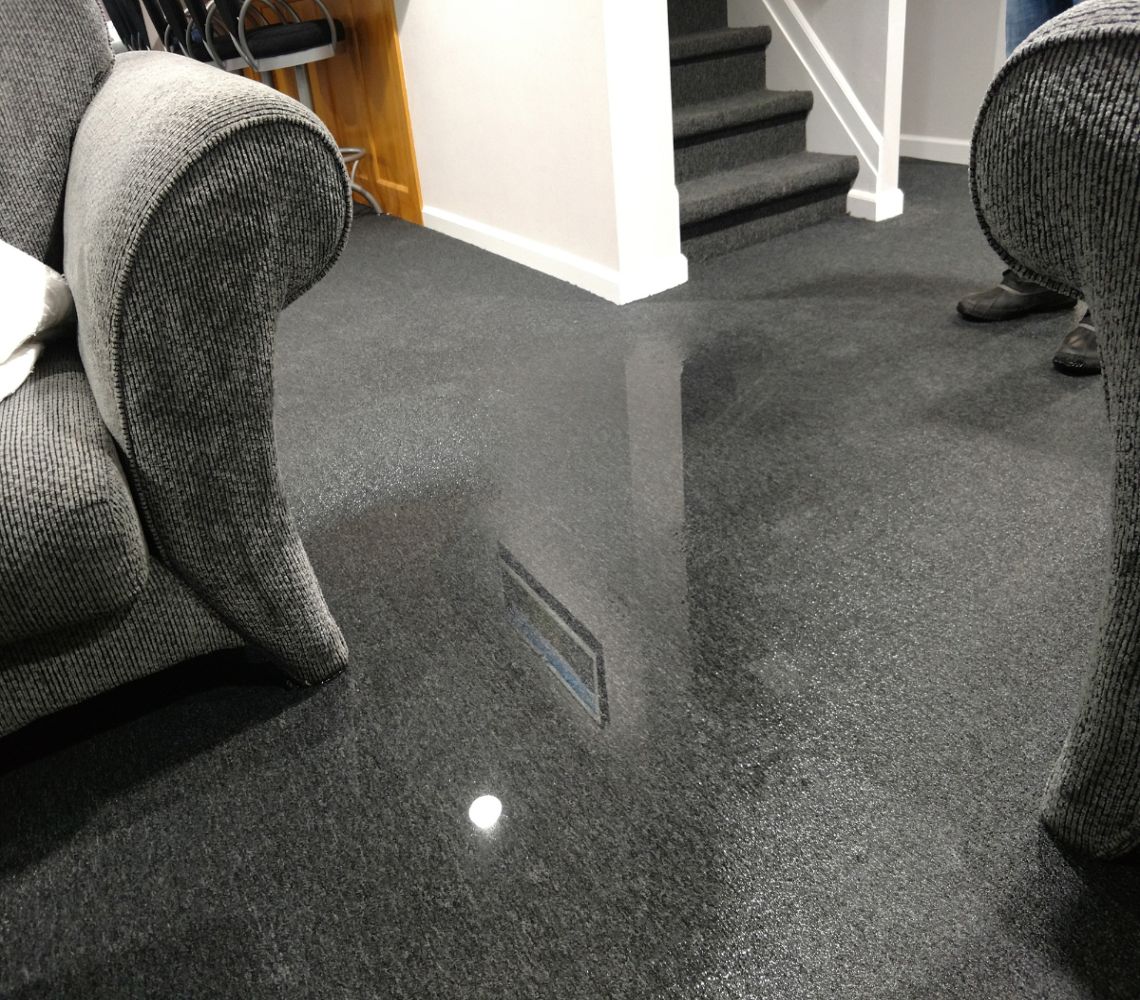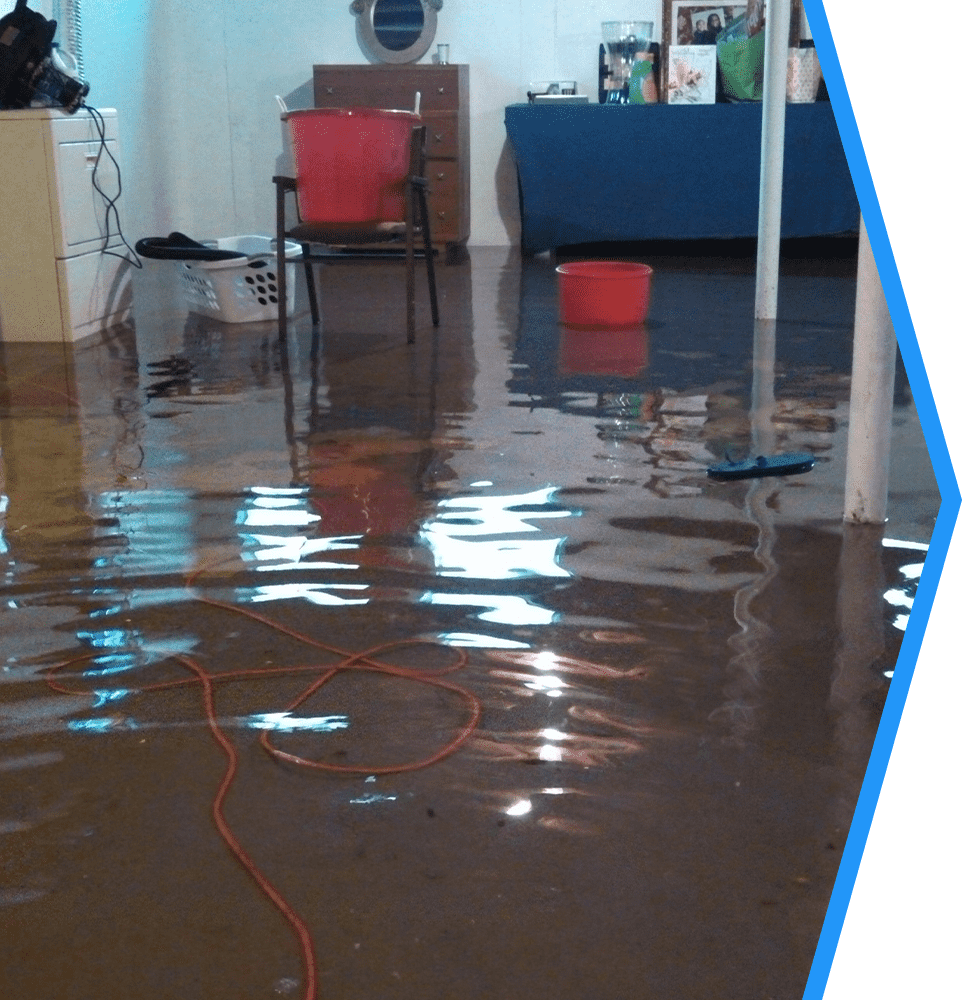Sterling Heights sewage cleanup.
If you are in need of a top rated sewage cleanup company in Sterling Heights who does basement cleanup service, please call Action Extraction at (586) 949-4448 for 24/7 emergency assistance. Click here to learn more about our basement flood cleanup services or Follow Us on Facebook!

Sewage Cleanup Company in Sterling Heights, MI
A restoration company can be a valuable asset in the event of a basement flood for several reasons:
- Expertise and Equipment: A professional restoration company has the expertise and specialized equipment to properly assess the extent of the damage and effectively remove excess water, dry out the affected area, and mitigate any mold or mildew growth.
- Quick Response Time: Water damage can cause significant harm to your property in a short amount of time. A restoration company can respond quickly to mitigate further damage and help prevent any long-term problems.
- Safety Concerns: Basement flooding can pose serious safety risks, such as electrical hazards or exposure to hazardous substances. A professional restoration company can ensure that the area is safe before beginning any restoration work.
- Insurance Claims: A reputable restoration company can help navigate the insurance claims process, ensuring that you receive the maximum coverage for the damage done to your property.
In summary, hiring a restoration company can save you time, money, and stress in the event of a basement flood. They can provide expert assistance, rapid response, ensure safety, and help with insurance claims.
For an experienced and trusted Sterling Heights Basement Flood Cleanup service, contact Action Extraction at (586) 949-4448 now!
Sewage Cleanup in Sterling Heights
Sewage backup incidents & cleanup in Sterling Heights, Michigan can be an issue for any homeowner or business owner, causing significant damage, health hazards, and disruption to daily life. Sterling Heights, like many urban areas, faces its share of challenges when it comes to sewage cleanup. However, the city has been proactive in addressing these issues, employing various strategies to mitigate the impact of such incidents and safeguard the well-being of its residents.
The Sterling Heights, MI, struggle of sewage cleanup is real:
Sterling Heights, situated in Macomb County, Michigan, experiences its fair share of sewage backup incidents due to a combination of factors such as aging infrastructure, heavy rainfall, and increased urbanization. The city’s sewer system, like many others across the country, is susceptible to overflows and blockages, leading to sewage backups into homes, businesses, and streets.
The consequences of sewage backups in Sterling Heights with proper cleanup companies.
The consequences of sewage backups are multifaceted and severe. Not only do they cause extensive property damage, including structural issues and contamination of belongings, but they also pose significant health risks. Raw sewage contains harmful bacteria, viruses, and other pathogens that can cause illnesses ranging from gastroenteritis to respiratory infections. Moreover, the foul odor associated with sewage backups can make affected areas uninhabitable until proper cleanup is conducted.
Government Initiatives for sewage cleanup in Sterling Heights, MI.
In response to the challenges posed by sewage backups, the city of Sterling Heights has implemented various initiatives aimed at preventing, managing, and cleaning up such incidents. One notable effort is the ongoing investment in upgrading and maintaining the city’s sewer infrastructure. By modernizing aging pipes, increasing capacity, and implementing advanced monitoring systems, the city aims to reduce the likelihood of sewer overflows and backups.
Furthermore, Sterling Heights has established robust emergency response protocols to swiftly address sewage backup incidents when they occur. This includes deploying specialized cleanup crews equipped with the necessary tools and protective gear to safely remove sewage, decontaminate affected areas, and restore normalcy as quickly as possible.
Sterling Heights community Involvement in sewage cleanup:
Beyond government-led initiatives, community involvement plays a crucial role in mitigating the impact of sewage backups in Sterling Heights. Residents and businesses are encouraged to take proactive measures to safeguard their properties, such as installing backflow prevention devices and maintaining their sewer lines. Additionally, raising awareness about the importance of proper waste disposal practices and reporting any signs of sewer problems promptly can help prevent larger-scale incidents.
The Role of professional sewage cleanup companies in Sterling Heights, Michigan:
In many cases, sewage cleanup requires professional expertise and specialized equipment to ensure thorough and safe restoration. Professional cleanup services in Sterling Heights play a vital role in this regard, offering comprehensive sewage cleanup and restoration services to affected properties. These professionals are trained to handle hazardous materials, mitigate health risks, and restore properties to their pre-loss condition efficiently.
Sewage cleanup in Sterling Heights, MI remains a significant challenge for communities like Sterling Heights, but proactive measures, government initiatives, community involvement, and professional cleanup services are instrumental in addressing this issue. By working together and investing in preventive measures and emergency response capabilities, Sterling Heights is better equipped to mitigate the impact of sewage backups and safeguard the well-being of its residents and businesses.

What contributes to the cost of Sewage Cleanup in Sterling Heights, Michigan?
Q: What factors contribute to the cost of sewage cleanup in Sterling Heights, Michigan?
A: Several factors influence the cost of sewage cleanup in Sterling Heights, including the extent of the damage, the size of the affected area, the type of property, and the severity of the sewage backup.
Q: How does the extent of damage affect the cost of sewage cleanup?
A: The extent of damage caused by a sewage backup significantly impacts the cleanup cost. Minor incidents may only require surface cleaning and disinfection, while more severe backups that result in structural damage or contamination of belongings can entail extensive restoration efforts, driving up the overall cost.
Q: Does the size of the affected area affect the cost of cleanup?
A: Yes, the size of the affected area directly correlates with the cost of cleanup. Larger properties or areas with multiple rooms impacted by sewage backups require more resources, time, and manpower to clean and restore, resulting in higher cleanup costs.
Q: How does the type of property influence the cost of sewage cleanup?
A: The type of property, whether residential, commercial, or industrial, affects the cost of sewage cleanup. Commercial and industrial properties often have larger square footage and more complex layouts than residential homes, leading to higher cleanup costs due to increased labor and material requirements.
Q: What role does the severity of the sewage backup play in determining cleanup costs?
A: The severity of the sewage backup, including factors such as the volume of sewage, the duration of exposure, and the presence of hazardous materials, directly impacts cleanup costs. More severe backups that require specialized equipment, extensive decontamination measures, and professional restoration services tend to be more costly to clean up.
Q: Are there additional expenses associated with sewage cleanup in Sterling Heights?
A: Yes, additional expenses may include emergency response fees, disposal costs for contaminated materials, repair or replacement of damaged infrastructure or belongings, and potential relocation expenses for displaced occupants during cleanup and restoration activities.
Q: How can property owners mitigate the cost of sewage cleanup in Sterling Heights?
A: Property owners can take proactive measures to mitigate the cost of sewage cleanup by investing in preventative maintenance, such as regular inspections of sewer lines and septic systems, installing backflow prevention devices, and maintaining proper waste disposal practices to reduce the risk of sewage backups.
Q: Are there insurance options available to cover the cost of sewage cleanup in Sterling Heights?
A: Yes, homeowners and business owners in Sterling Heights can purchase insurance policies that provide coverage for sewage backups and related cleanup costs. It’s essential to review policy terms and coverage limits to ensure adequate protection against sewage-related damages.
Q: What resources are available in Sterling Heights to assist property owners with sewage cleanup?
A: Sterling Heights offers resources such as emergency response services, professional cleanup and restoration companies, and government assistance programs to support property owners in addressing sewage cleanup and restoration needs.
Q: What steps can property owners take to minimize the risk of future sewage backups and associated cleanup costs?
A: Property owners can reduce the risk of future sewage backups by maintaining their sewage systems, investing in preventive measures, such as sewer line inspections and repairs, and staying informed about local regulations and best practices for sewage management and cleanup.

The history of Sewage Cleanup in Sterling Heights, Michigan
The history of sewage cleanup in Sterling Heights, Michigan, reflects the city’s ongoing efforts to address the challenges posed by aging infrastructure, urban development, and environmental concerns. Over the years, Sterling Heights has faced various sewage-related issues, prompting the implementation of measures aimed at improving wastewater management, enhancing infrastructure resilience, and safeguarding public health.
Early Development and Infrastructure Challenges:
Sterling Heights, like many suburban communities across the United States, experienced rapid growth and development following World War II. As the population expanded and urbanization intensified, the city’s infrastructure, including its sewage system, struggled to keep pace with the increasing demands.
In the early decades of Sterling Heights’ development, the city relied on conventional sewage systems consisting of pipes, pumps, and treatment facilities to manage wastewater. However, as the population grew and land use patterns changed, the existing infrastructure became strained, leading to issues such as sewage overflows, backups, and pollution of waterways.
Emergence of Environmental Awareness:
During the latter half of the 20th century, heightened environmental awareness and regulatory changes brought attention to the need for improved sewage management practices. Concerns about water pollution, public health risks, and environmental degradation prompted local and state authorities to enact stricter regulations governing wastewater treatment and disposal.
In response to these developments, Sterling Heights began investing in upgrades and expansions to its sewage infrastructure. This included the construction of new treatment plants, the installation of advanced filtration and disinfection systems, and the implementation of preventive maintenance programs to reduce the risk of system failures and backups.
Modernization and Innovation:
As technology advanced and best practices evolved, Sterling Heights continued to modernize its sewage management infrastructure. The city embraced innovations such as remote monitoring systems, predictive analytics, and green infrastructure solutions to improve the efficiency, reliability, and sustainability of its wastewater systems.
Furthermore, Sterling Heights collaborated with regional partners, including neighboring municipalities and watershed management agencies, to address shared sewage-related challenges. By participating in collaborative initiatives and sharing resources, Sterling Heights strengthened its capacity to respond to emergencies, coordinate maintenance activities, and implement long-term strategies for sewage cleanup and management.
Community Engagement and Education:
In addition to infrastructure upgrades and technological advancements, community engagement and education have played a crucial role in Sterling Heights’ efforts to address sewage cleanup challenges. The city has implemented outreach programs, public awareness campaigns, and educational initiatives to inform residents about proper waste disposal practices, the importance of routine maintenance, and the risks associated with sewage backups.
Through community involvement and partnerships with local stakeholders, Sterling Heights has fostered a sense of shared responsibility for protecting the environment and public health. Residents, businesses, and community organizations have been encouraged to report sewage-related issues promptly, participate in cleanup efforts, and adopt sustainable practices to minimize their impact on the city’s wastewater systems.
Conclusion:
The history of sewage cleanup in Sterling Heights, Michigan, reflects the city’s commitment to addressing sewage-related challenges through infrastructure improvements, technological innovation, community engagement, and environmental stewardship. While the city has made significant progress in mitigating the impact of sewage backups and pollution, ongoing vigilance, investment, and collaboration are essential to ensuring the long-term resilience and sustainability of Sterling Heights’ sewage management infrastructure.



